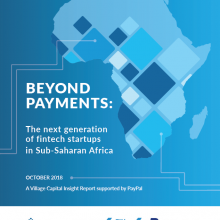Beyond Payments: The Next Generation of Fintech Startups in Sub-Saharan Africa

Beyond Payments in Africa
Fintech in Africa is evolving quickly. Today, there are hundreds of fintech startups across the continent – but how has the sector changed in recent years? This report takes a look at the next generation of fintech in Sub-Saharan Africa.
Recommendations
The article points to opportunities for the private sector, particularly startups who can deliver financial technology (fintech) solutions for credit assessment, lending, identity verification, insurance, and savings. Several notable trends are motivating SSA innovations in fintech services:
- Technology: The introduction and adoption of technology-enabled financial services that decrease transaction cost (e.g., cryptocurrency and blockchain technology), cut middlemen (lenders and borrowers connecting without the bank as an intermediary), and enable the creation of targeted and customized financial products (e.g., microinsurance for farmers) to large underserved populations, effectively opening up new opportunities to market fintech products.
- Government and philanthropic funding support: Agriculture finance—a high risk sector, is opening up with government funding to agribusinesses. Most notably, the Maputo Declaration allocates 10% of budgetary resources to agriculture and rural development. Fintech companies offering services in support of smart financial management (e.g., savings, investments, etc.) also benefit from philanthropic and government initiatives that increase financial literacy and create an appetite for savings products and services.
- Relaxed policy and regulatory environment: Hurdles to the entry of fintech startups are significantly less as the sector is not as heavily regulated as traditional financial institutions. On the other hand, policies of government-managed social health insurance schemes have been unable to reach the informal sector. This gap can be filled in by fintech companies.
Inspired by the success and growing market for mobile money in the region, financial technologies (fintech) in SSA are evolving to cover other areas in mobile financing and financial service delivery. Venture capital firm Village Capital and its partners are supporting early-stage fintech startups in SSA, and this report features its 2018 cohort of 12 startups that are helping farmers, small businesses, cooperatives, and households gain greater and better access to mobile financial services. These startups are operating in promising sectors for fintech in the region—agriculture, alternative credit-scoring and lending, low-cost insurance, and savings platforms. Favorable demographic trends in the region, improved digital and financial literacy, and the pervasiveness of mobile technologies that enable greater access to financial services are driving growth in this sector.
While SSA fintech firms have gained a measure of success in delivering innovative financial services, challenges to its development are still present in the region. There are still high-cost sectors or certain domains in the financial services sector—insurance, for example—that require huge capital investments. Companies aiming to reach scale often require partnering with larger insurance firms to extend their reach to populations that are difficult to reach. These sorts of partnerships are sometimes difficult to forge. There is also the prospect of tighter regulation; fintech companies have been flagged of the threat of tighter regulation on digital lending and data usage, as Africa gradually adopts Europe’s General Data Protection Regulation (GDPR) and the Payment and Services Directive 2 (PSD2). Lending startups who rely on data are monitoring developments in this front.
There is also the challenge of behavior change and financial literacy. Businesses bear the burden of educating their target customers on financial options available to them. This is especially true for fintech companies offering savings products; they spend considerable resources to convince potential users to save digitally outside cooperatives and other traditional savings institutions. Cybercrime and fraud is also a major issue, with Africa identified as a hotspot for cybersecurity threats. Identity theft, phishing, vishing, malware, and SIM swaps are common in the region, which are considerable threats to digital data security.